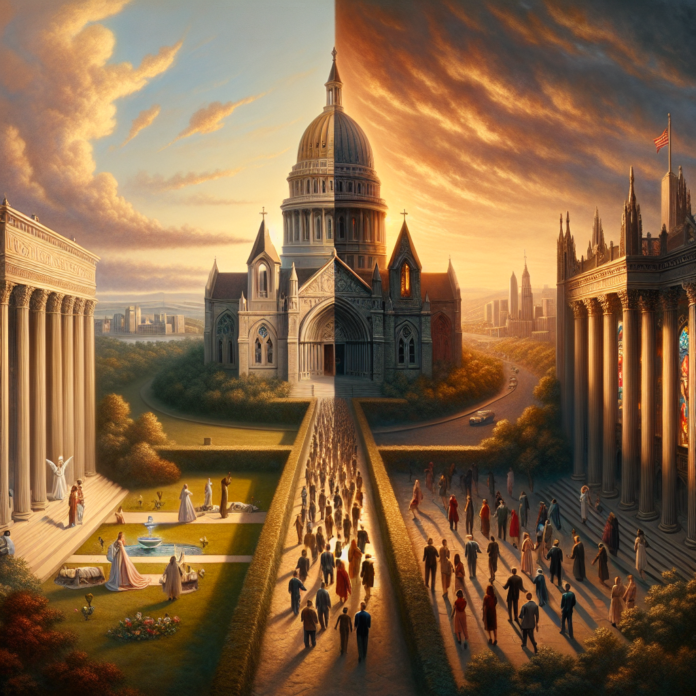Keeping Sacred and Secular Apart: A Look at Catholic Political Involvement
Throughout history, the intertwining of religious belief and political action has provoked robust debate across societies. In examining this confluence within Catholicism, we are particularly drawn to the contemporary political involvement of Catholics and the internal tension between traditionalism and progressivism.
From the earliest days of the Church, there has been a profound impact of Catholic thought on political systems. One might recall Pope Leo XIII’s encyclical "Rerum Novarum" in 1891, which underscored the Church’s commitment to social justice and the rights of workers during the Industrial Revolution. This marked an early instance where the Catholic Church took a stand on socio-political issues, reflecting not only its moral stance but also its potential for influence on public policy.
In modern times, the debate over the appropriate role of the Church in politics has become increasingly polarized. Traditionalists often argue for a return to more conservative values, seeking to maintain a firm foothold in political discourse by emphasizing teachings that align closely with their more rigid interpretations of doctrine. However, the progressive wing of the Church, exemplified by the papacy of Pope Francis, encourages a focus on social justice, inclusion, and environmental stewardship – issues that resonate deeply with contemporary public consciousness.
Pope Francis, in his papal encyclical "Laudato Si’," provided a progressive blueprint for addressing climate change – an existential crisis that transcends religious boundaries and calls for global solidarity and action. This document, alongside his other teachings, underscores a Vatican inclination towards progressive values, advocating for a Church that walks with the marginalized, the poor, and the disenfranchised.
In contrast, Catholic conservatism, often romantically tied to the Latin Mass, presents a vision of the Church that some argue is out of touch with the evolving needs of a global society. While the Latin Mass has its nostalgic allure and spiritual depth, its resurgence among certain quarters can be partly viewed as a resistance to the progressive reforms of the Second Vatican Council – reforms that sought to make the Church more accessible and responsive to the laity.
The cultural attachment to the Latin Mass is not merely about liturgical preference; it signals a broader ideological stance that resists change. Much like the Latin Mass, conservative Catholicism clings to a bygone era, advocating for positions on issues like reproductive rights, LGBTQ+ inclusion, and gender equality that seem increasingly discordant with modern societal values. This form of traditionalism can at times appear not just anachronistic but also exclusionary, potentially alienating those who seek a more inclusive and compassionate Church.
Furthermore, the USA presents an illustrative battleground for these conflicting ideologies within Catholicism. The political involvement of conservative Catholics has, in certain circumstances, led to alarming alliances with far-right movements, particularly around contentious issues like abortion and religious liberty. It is worth noting that these alliances sometimes prioritize doctrinal purity over the Church’s historical emphasis on social justice and the common good.
In contrast, progressive Catholic activism often seeks a more holistic faith-based approach to politics – one that embodies the social teachings of the Church while promoting an inclusive, forward-thinking agenda. The "Nun on the Bus" movement, for instance, is a vivid example of progressive Catholic activism that champions economic justice, healthcare access, and immigration reform, aligning closely with Pope Francis’s emphasis on the Church’s preferential option for the poor.
History has shown that the Catholic Church can be an agent of profound social transformation. We need not look further than the role of Catholic leaders in the Civil Rights Movement or the intervention of Catholic Charities in social services. However, the internal schism between traditionalist and progressive factions threatens the Church’s ability to present a unified moral vision that resonates with contemporary societies.
In summation, keeping sacred and secular apart might not just mean insulating politics from religious dogma but also ensuring that religious involvement in politics champions values that promote social welfare, justice, and inclusion. The progressive Catholic vision inspired by Pope Francis offers a path forward, one that honours the Church’s rich traditions while boldly addressing the modern world’s challenges.
While it is vital to respect and preserve the deeply spiritual aspects of Catholic worship and tradition, including the Latin Mass for those who find deep meaning in it, the Church’s political engagement must evolve. Embracing progressivism ensures that Catholicism remains a dynamic and relevant force, contributing positively to socio-political discourse and action in a rapidly changing world.
